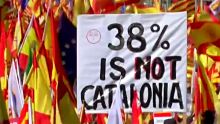US President Donald Trump said "we'll see" when asked on Sunday whether the United States would attack North Korea.
His comment after leaving a church service came after sharp condemnation on Twitter earlier in the day following North Korea's overnight nuclear test.
More World News Videos
Will Trump attack North Korea?
As North Korea conducts its sixth and most powerful nuclear test, US President Trump considers his response.
Mr Trump described the test and North Korea's announcement that it had detonated a hydrogen bomb that could be attached to a missile capable of reaching the US mainland as "very hostile and dangerous to the United States".
The President also used the series of tweets to admonish South Korea for its handling of the crisis.
Mr Trump wrote: "North Korea has conducted a major Nuclear Test. Their words and actions continue to be very hostile and dangerous to the United States... North Korea is a rogue nation which has become a great threat and embarrassment to China, which is trying to help but with little success."
North Korea has conducted a major Nuclear Test. Their words and actions continue to be very hostile and dangerous to the United States.....
— Donald J. Trump (@realDonaldTrump) September 3, 2017
He also delivered a scolding to South Korea, a longtime US ally, stating that "appeasement with North Korea will not work" and suggesting that more severe steps must be taken to influence Kim Jong-un's government.
In a third Sunday morning tweet, the President wrote: "South Korea is finding, as I have told them, that their talk of appeasement with North Korea will not work, they only understand one thing!"

A further tweet later said the United States was considering cutting trade to any country doing business with North Korea.
That statement would appear to suggest the US would place an embargo on trade to China.

The criticism of South Korea – a democratic nation and a long-time economic and diplomatic partner with the United States – comes amid escalating economic tensions over a Trump proposal to withdraw the United States from a bilateral free-trade agreement.
..North Korea is a rogue nation which has become a great threat and embarrassment to China, which is trying to help but with little success.
— Donald J. Trump (@realDonaldTrump) September 3, 2017
The move would be in keeping with Mr Trump's campaign promise to end what he considers unfair trade competition from foreign countries, but the President's advisers have cautioned would strain ties with South Korea amid the mounting North Korean nuclear crisis.
Mr Trump weighed in on Sunday morning from the White House. His comments came just a few hours after he spoke with Japanese Prime Minister Shinzo Abe, a key ally in the region.
In a Saturday evening phone call – which Mr Trump made from aboard Air Force One as he returned home to Washington from his visit to storm-battered Texas and Louisiana – the two leaders discussed "ongoing efforts to maximise pressure on North Korea," according to the White House.
South Korea is finding, as I have told them, that their talk of appeasement with North Korea will not work, they only understand one thing!
— Donald J. Trump (@realDonaldTrump) September 3, 2017
"The two leaders reaffirmed the importance of close cooperation between the United States, Japan and South Korea in the face of the growing threat from North Korea," read a statement from the White House.
Trump also spoke recently with South Korean President Moon Jae-in. In a call on Friday, the two leaders talked about "our coordinated response to North Korea's continued destabilising and escalatory behaviour," according to the White House.
"President Trump and President Moon pledged to continue to apply strong diplomatic and economic pressure on North Korea and to make all necessary preparations to deter and defend against the growing threat posed by North Korea," read a White House statement.
"The two leaders agreed to strengthen our alliance through defense cooperation and to strengthen South Korea's defence capabilities. President Trump provided his conceptual approval of planned purchases by South Korea of billions of dollars in American military equipment."
Washington Post














